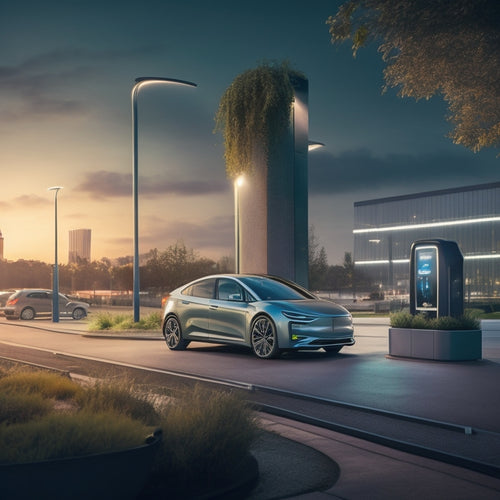
Solar Panel Home Battery Storage
Share
By integrating a home battery storage system with your solar panels, you can greatly reduce your reliance on the grid and seamlessly shift to a more sustainable and cost-effective energy solution. This setup allows you to manage your energy usage and store excess energy generated during the day for later use, reducing your utility bills and mitigating cost fluctuations. With a backup power solution in place, you'll have a steady power supply even during outages, and contribute to a cleaner environment. As you investigate the world of solar panel home battery storage, you'll uncover the finer details of optimizing energy efficiency and making the most of your investment.
The Essentials
- Solar panel home battery storage enables energy independence, reducing reliance on the grid and providing a steady power supply through renewable energy capture and storage.
- Home battery storage significantly reduces utility bills by optimizing energy usage, mitigating cost fluctuations, and utilizing stored energy during peak demand times.
- Lithium-ion batteries outperform lead-acid batteries in cycle life, with a significant advantage in lifespan, making them a popular choice for home energy storage solutions.
- Depth of discharge (DOD) impacts battery cycle life and performance, and balancing energy storage and battery longevity is crucial for reliable off-grid systems.
- Smart technology enables real-time monitoring and optimization of energy efficiency, allowing homeowners to manage energy consumption and maximize energy harvesting.
Reduce Grid Reliance Now
By integrating a home battery storage system with your solar panels, you'll reduce your reliance on the grid and achieve energy independence now.
This means you'll be generating and storing your own clean energy, which in turn will lower your bills.
With this setup, you'll have more control over your energy usage and costs.
By storing excess energy generated during the day with energy storage solutions, you can use it at night or during power outages.
Energy Independence Now
Regularly, homeowners find themselves at the mercy of the grid, subject to fluctuating electricity rates and unpredictable outages.
You can break free from this dependency by embracing energy independence. By integrating solar panel home battery storage into your energy management system, you'll reduce your reliance on the grid and shift towards a more sustainable, eco-friendly living.
With a reliable Backup Power Solutions in place, you can safeguard your family's comfort and well-being by keeping lights, internet, and communication devices powered on, providing reassurance and stability in times of uncertainty.
This smart technology enables you to capture renewable energy and store it for later use, ensuring a steady power supply even during outages. Home automation features allow you to monitor and control your energy usage, optimizing power efficiency and minimizing waste.
With backup solutions in place, you'll enjoy climate resilience and peace of mind.
Lower Your Bills
As you shift towards energy independence, you're likely wondering how solar panel home battery storage can impact your wallet.
The good news is that it can considerably lower your bills by reducing your reliance on the grid. By integrating a Home Solar Battery into your system, you can optimize your energy efficiency and reduce your reliance on non-renewable energy sources.
With a home battery storage system, you can store excess energy generated by your solar panels during the day and use it at night or during power outages. This means you'll be less dependent on utility companies and their fluctuating rates.
Increased Energy Independence
With home battery storage, you're no longer bound to the grid's schedule, allowing you to power your home on your own terms.
You can store excess energy generated by your solar panels during the day and use it at night or during power outages, freeing you from reliance on the grid.
By investing in affordable home battery solutions like Tesla Powerwall, you can greatly reduce your energy bills and guarantee backup power during outages.
This means you'll have the freedom to manage your energy usage as you see fit, without being tied to the whims of your utility company.
Power On Your Terms
Your home's energy fate is no longer tied to the whims of the grid, thanks to solar panel home battery storage. With this technology, you're in control of your energy usage, generating and storing power on your own terms.
This means you can utilize the power of renewable energy sources like sunlight and wind, reducing your reliance on non-renewable energy providers.
In a smart home equipped with solar panel home battery storage, you can monitor and manage your energy usage in real-time.
This allows you to optimize your energy consumption, reducing waste and saving money on your energy bills. You can also program your system to charge your batteries during off-peak hours, taking advantage of lower electricity rates.
Free From Grid Ties
Solar panel home battery storage liberates you from the constraints of grid-tied electricity, granting increased energy independence.
You're no longer bound to the grid's schedules, outages, or rate hikes. With energy storage, you can utilize the power of the sun and store it for later use, reducing your reliance on the grid.
This newfound freedom comes with numerous off-grid advantages. You'll experience fewer power outages, as your stored energy kicks in when the grid fails. You'll also enjoy lower energy bills, as you're generating and storing your own power. Additionally, you'll reduce your carbon footprint, contributing to a cleaner environment.
Solar panel home battery storage also provides a sense of security. You'll have a reliable source of power during emergencies, keeping your lights on and your appliances running.
With energy storage, you're in control of your energy needs, making you less dependent on the grid. This increased energy independence is an essential step towards a more sustainable, self-sufficient lifestyle.
Depth of Discharge Matters
When you're considering solar panel home battery storage, you'll want to keep an eye on the depth of discharge (DOD) to guarantee optimal battery usage.
A deeper DOD can reduce the overall cycle life of your battery, so it's vital to strike a balance between energy storage and battery longevity.
Additionally, understanding how DOD impacts your battery's performance is significant when designing off-grid systems that require reliable renewable energy storage solutions.
Optimal Battery Usage
Optimal Battery Usage (Depth of Discharge Matters)
This critical aspect of battery maintenance involves understanding the best depth of discharge (DOD) to guarantee your home battery storage system operates efficiently and extends its lifespan. You want to maximize energy storage while avoiding over-discharge, which can reduce your battery's lifespan.
| Energy Management Strategy | Description | Benefits |
|---|---|---|
| Peak Shaving | Reduce peak energy consumption from the grid | Lower energy bills, reduced strain on grid |
| Load Shifting | Shift non-essential loads to off-peak hours | Enhanced energy usage, reduced energy waste |
| Backup Power | Provide energy during grid outages | Reliable power supply, increased independence |
| Smart Monitoring | Track energy usage patterns and battery health | Data-driven decision making, extended battery lifespan |
| Inverter Efficiency | Enhance inverter performance for maximum energy harvest | Increased energy yield, reduced energy losses |
Cycle Life Impact
Every 80% to 90% discharge can reduce your battery's lifespan by around 10 to 20 cycles. This is because deep discharges put more stress on the battery's internal chemistry, causing it to degrade faster.
You'll want to aim for a maximum depth of discharge (DOD) of 50% or less to maximize your battery's lifespan.
Different battery chemistries have varying sensitivities to DOD. For example, lithium-ion batteries are more forgiving than lead-acid batteries when it comes to deep discharges.
However, even lithium-ion batteries will eventually suffer from reduced capacity and lifespan if consistently pushed beyond 50% DOD.
Proper maintenance practices, such as monitoring your battery's state of charge and adjusting your usage accordingly, can help mitigate the negative impacts of deep discharges.
Watt-Hour Capacity Considerations
When selecting a home battery storage system, you'll need to evaluate the watt-hour capacity that meets your daily energy needs, which is especially vital for maximizing energy harvesting and reducing blackouts with reliable backup power solutions renewable energy solutions.
This involves calculating your total daily energy consumption in watt-hours and ensuring the battery's deep cycle capacity can cover that amount, considering the energy storage systems and battery banks that will be used.
Deep Cycle Capacity
As you steer through the world of home battery storage, it's important to grasp the concept of deep cycle capacity, which refers to the total amount of energy a battery can store and release over its lifespan.
This significant aspect affects the overall performance and longevity of your solar panel home battery storage system. Deep cycle capacity is influenced by the battery chemistry, with different types offering varying levels of capacity. For instance, lithium-ion batteries generally offer higher deep cycle capacity than lead-acid batteries.
Proper capacity management is essential to guarantee you're getting the most out of your battery.
It's crucial to take into account factors like depth of discharge (DOD), which affects the battery's lifespan. A battery with a higher DOD can be discharged to a lower state of charge, resulting in more usable energy. However, this may reduce its overall lifespan.
Daily Energy Needs
You need to determine your daily energy needs to accurately size your solar panel home battery storage system. This means calculating your total energy consumption in watt-hours (Wh) per day.
Start by identifying your essential appliances and their respective power ratings in watts (W). Then, estimate the number of hours you'll use each appliance daily. Multiply the wattage by the usage hours to get the daily energy consumption in watt-hours.
For example, if you have a 100W refrigerator that runs for 8 hours a day, its daily energy consumption would be 800Wh.
Add up the daily energy needs of all your essential appliances to get your total daily energy requirement. When choosing a battery, consider its watt-hour capacity and battery efficiency, which affects how much usable energy you'll get. A higher battery efficiency means more usable energy from the same capacity.
Ascertain your solar panel home battery storage system can meet your daily energy needs, so you can enjoy uninterrupted power and freedom from the grid.
Lithium-Ion Beats Lead-Acid
You'll find that lithium-ion batteries outperform lead-acid batteries regarding cycle life, with some lithium-ion batteries capable of up to 5,000 cycles or more.
In contrast, lead-acid batteries typically top out at around 1,000 to 2,000 cycles.
This significant difference in cycle life means lithium-ion batteries will last longer and require less frequent replacements.
Longer Cycle Life
Within the domain of home battery storage, cycle life is a critical factor in determining the overall value of a solar panel system, with lithium-ion batteries boasting a significant advantage over their lead-acid counterparts.
As you assess your options, it's vital to understand that cycle life refers to the number of charge and discharge cycles a battery can handle before its capacity degrades. Lithium-ion batteries can last for up to 5,000 cycles, while lead-acid batteries typically max out at around 1,000 cycles.
This disparity is largely due to differences in battery chemistry. Lithium-ion batteries have a more stable chemistry, which reduces wear and tear on the battery. In contrast, lead-acid batteries are more prone to degradation due to temperature effects, charging efficiency, and usage patterns.
To maximize the lifespan of your lithium-ion battery, follow maintenance tips such as avoiding extreme temperatures, keeping the battery away from moisture, and monitoring performance metrics.
Frequently Asked Questions
Can I Charge My Solar Panel Battery With a Generator?
You can charge your battery with a generator, but consider generator compatibility and charging efficiency. Confirm the generator's output matches your battery's input, and choose a charger that optimizes energy transfer to maximize your independence.
Do Solar Batteries Work With Existing Solar Panel Systems?
You'll be pleased to know that most solar batteries are designed to work with existing solar panel systems, but you'll need to assess solar battery compatibility and installation factors, such as voltage, ampere, and mounting requirements, to guarantee a seamless integration.
How Long Do Home Battery Storage Systems Typically Last?
You're wondering how long home battery storage systems last. Typically, they last 10-15 years, but proper maintenance tips, like avoiding deep discharges and keeping them cool, can extend their battery lifespan, giving you more freedom from grid reliance.
Are Solar Panel Home Batteries Eligible for Tax Credits?
Unleash the treasure chest of tax benefits! You'll be thrilled to know that, yes, you're eligible for tax credits on home batteries, which can greatly offset battery installation costs, giving you the freedom to utilize renewable energy without breaking the bank.
Can I Use a Single Battery for Multiple Solar Panel Arrays?
You can connect multiple arrays to a single battery, but ascertain the battery capacity matches the combined output of the arrays, and verify array compatibility to avoid system inefficiencies and safety risks.
Final Thoughts
As you take the leap towards solar panel home battery storage, remember that energy independence is within your grasp. By investing in a reliable system, you'll reduce your reliance on the grid and lock in a cleaner, more sustainable future. But don't just stop at any battery - choose a lithium-ion powerhouse that will release its full potential, and reap the benefits of a deeper depth of discharge. The question is, what's holding you back from utilizing the power of the sun?
Related Posts
-

Solid State Batteries in Electric Vehicles
Solid-state batteries revolutionize electric vehicles by offering a longer lifespan and higher energy density than tr...
-

Net Metering in Renewable Energy's Future
Net metering's future is vital for driving renewable energy growth and financial savings. You can reduce your electri...
-

Replacing Old Appliances With Sustainable Alternatives
Replacing old appliances with sustainable alternatives can change your home into an energy-efficient space. Not only ...


